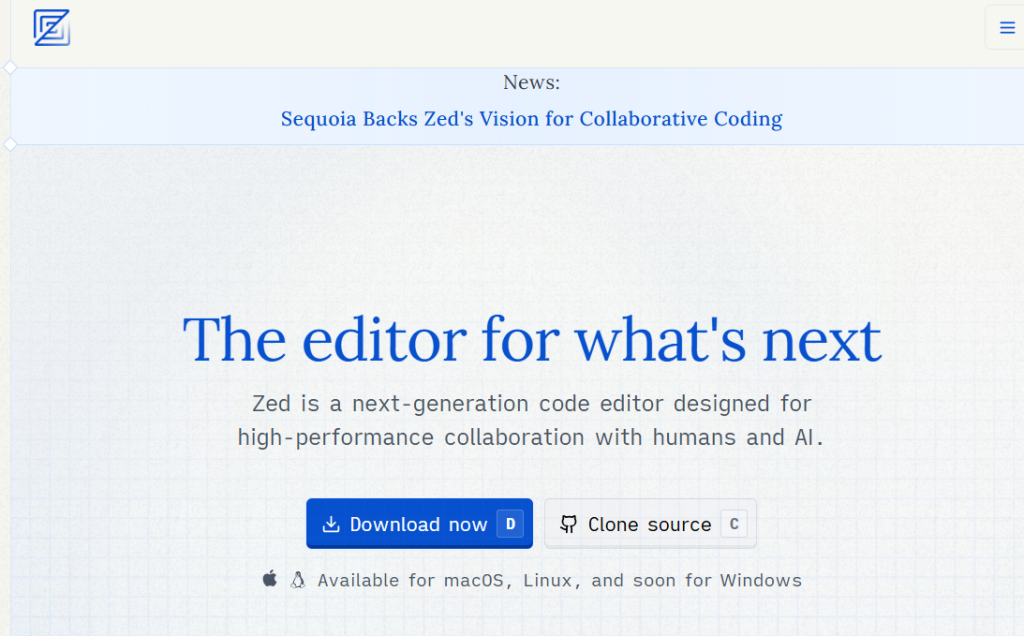Zed Industries Raises $32 Million to Reinvent Collabrative Software Development
August 22, 2025
byFenoms Start-Ups

The way teams build software is changing, and Zed Industries is right at the center of that transformation. Founded by Nathan Sobo, Zed has officially raised $32 million in Series A funding, with Sequoia Capital leading the round. The raise underscores not only the company’s vision but also the urgency for better, faster, and more collaborative developer tools in a world where distributed teams are the norm.
Why Developers Need a New Kind of Platform
For decades, software engineering has been stuck with a patchwork of tools: text editors, messaging platforms, GitHub repos, project trackers, and endless plug-ins. While these tools work individually, they create friction when developers actually need to collaborate in real time.
That’s where Zed comes in. Designed as a multiplayer code editor, Zed provides an ultra-fast, extensible platform where developers can write, debug, and build collaboratively - without juggling half a dozen apps. Imagine the seamlessness of Google Docs, but applied to the depth and complexity of software development. That’s the future Zed is betting on.
The Fresh Capital and What It Means
With $32 million secured, Zed plans to accelerate development, expand its engineering team, and broaden adoption among professional developer communities. For Sequoia Capital to back the round signals strong belief in Zed’s potential to become not just a tool, but the default collaboration layer for software teams worldwide.
The momentum around developer infrastructure is massive right now, and Zed’s approach has the potential to unlock a new era of productivity - one where distance and location no longer slow down innovation.
A Key Lesson for Founders Scaling in Crowded Markets
Here’s something worth pausing on: in highly competitive spaces, founders often obsess over differentiation at the feature level. But what really moves the needle isn’t features - it’s foundational shifts in workflow.
Zed illustrates this perfectly. The core innovation isn’t “better syntax highlighting” or “faster plug-ins.” It’s a re-architecture of how developers collaborate, shifting the editor itself into a multiplayer environment. This is the type of move that competitors can’t easily replicate because it requires rebuilding assumptions from the ground up.
For founders, the insight is simple but powerful: if you want to displace entrenched incumbents, don’t fight them where they’re strongest. Change the rules of the game by reframing the problem itself. When you shift the workflow, you shift the market.
Why Real-Time Collaboration is the Future of Development
As software eats the world, speed and agility determine who wins. But speed isn’t just about faster compilers or shorter release cycles - it’s about reducing friction between people. Distributed teams, spanning time zones and continents, can’t afford the back-and-forth of async-only workflows.
Platforms like Zed provide shared editing, instant communication, and synchronous visibility into projects. Instead of waiting on feedback loops, developers can resolve issues in the moment, cutting hours (sometimes days) from the development lifecycle.
In an era where 74% of software teams report working in hybrid or fully remote settings (Stack Overflow Developer Survey, 2023), the demand for synchronous tools is only growing.
Where Zed Fits in the Bigger Picture
The market for developer tools is both enormous and rapidly evolving. According to Gartner, global software development tools are projected to reach $17.1 billion by 2027, growing at a CAGR of 11%. Within that, collaboration-centric platforms are among the fastest growing subcategories, driven by the shift to distributed teams.
The big players - GitHub, JetBrains, Microsoft’s Visual Studio Code - dominate today’s landscape. But their DNA was built in an era when local, single-player editing was the default. Zed, by contrast, is built from day one for multiplayer coding, which gives it a long-term advantage as distributed work becomes the global standard.
Industry Outlook
The software development industry isn’t slowing down. IDC projects that the global developer population will reach 43 million by 2026, up from 27 million today. That’s a massive user base, and every one of those developers needs tools that help them build faster and better.
What’s shifting is how teams work:
- Remote-first organizations now account for 16% of all companies globally, with even more adopting hybrid models (Owl Labs, 2024).
- AI-assisted coding is exploding, with GitHub Copilot already boasting over a million paying users. But AI doesn’t remove the need for collaboration - it amplifies it. Developers will still need platforms where they can review, debug, and ship together.
This creates a massive opening for Zed to become not just another editor, but a core part of the development stack - the place where human collaboration and machine assistance meet.
Final Thoughts
With $32 million in Series A funding from Sequoia Capital, Zed is setting itself up to redefine how code gets written in a collaborative world. The future of software development isn’t about building faster alone - it’s about building together, seamlessly and in real time.
Zed’s challenge now is execution: scaling adoption among developers, proving durability in enterprise environments, and maintaining speed while growing. But if it succeeds, it won’t just be another editor. It could become the collaboration backbone for the next generation of global software teams.









